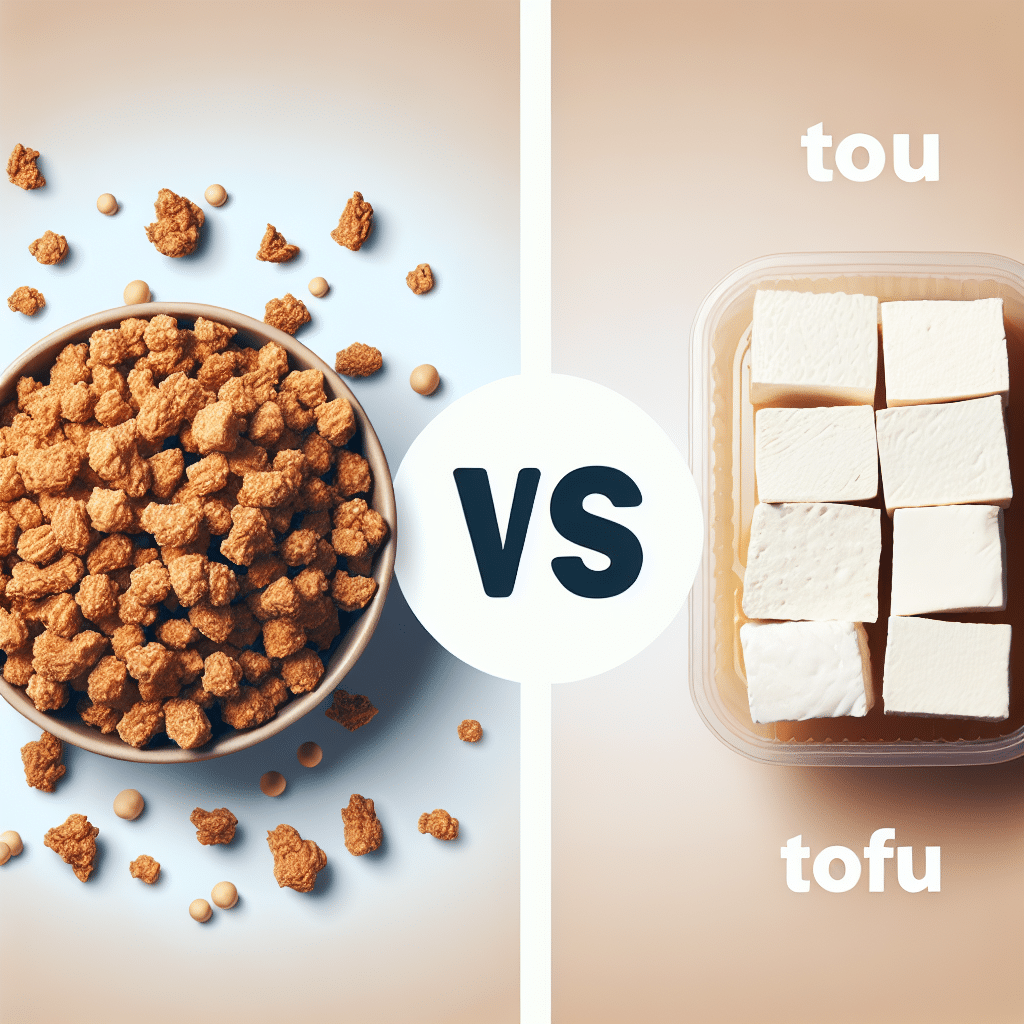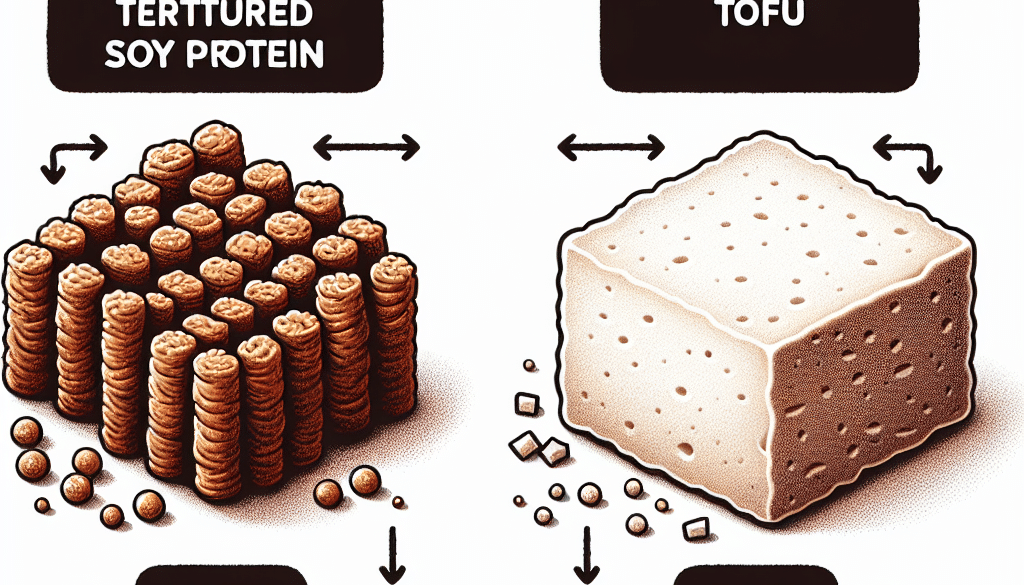Is Textured Soy Protein The Same As Tofu?
-
Table of Contents
- Textured Soy Protein vs. Tofu: Understanding the Differences
- What is Textured Soy Protein?
- What is Tofu?
- Production Process: TSP vs. Tofu
- Nutritional Comparison
- Culinary Uses
- Environmental and Health Considerations
- Conclusion: Distinct Yet Nutritious Soy Options
- Discover ETprotein’s High-Quality Protein Products
Textured Soy Protein vs. Tofu: Understanding the Differences

When it comes to plant-based proteins, soy is a powerhouse ingredient that has been used in various forms for centuries. Two popular soy products that often get mentioned in the same breath are textured soy protein (TSP) and tofu. While both are derived from soybeans, they are distinct products with unique characteristics, uses, and nutritional profiles. This article will delve into the differences between textured soy protein and tofu, helping consumers make informed choices about their dietary preferences.
What is Textured Soy Protein?
Textured soy protein, also known as textured vegetable protein (TVP), is a processed food product made from soy flour after the soybean oil has been extracted. It is often used as a meat substitute or meat extender. TSP is available in various shapes and sizes, including chunks, flakes, and granules, and it has a fibrous, spongy texture that can mimic the mouthfeel of meat when hydrated.
What is Tofu?
Tofu, also known as bean curd, is a traditional Asian food that has been consumed for thousands of years. It is made by coagulating soy milk and pressing the resulting curds into soft white blocks. Tofu comes in several consistencies, such as silken, soft, firm, and extra-firm, each suited to different culinary applications.
Production Process: TSP vs. Tofu
The production processes for textured soy protein and tofu are quite different, which contributes to their distinct textures and uses.
- Textured Soy Protein: The process begins with defatted soy flour, which is then cooked under pressure and extruded into various shapes. The extrusion process heats and pressurizes the soy flour, causing it to expand and change texture. Once cooled, TSP is dry and can be stored for long periods. Before consumption, it needs to be rehydrated, which allows it to absorb flavors from seasonings and sauces.
- Tofu: Tofu production starts with soaking, grinding, and boiling soybeans to create soy milk. Coagulants like calcium sulfate, magnesium chloride, or lemon juice are then added to the soy milk to separate the curds from the whey. The curds are pressed into molds to form blocks of tofu. The pressing time and weight determine the firmness of the tofu.
Nutritional Comparison
Both textured soy protein and tofu are excellent sources of plant-based protein, but their nutritional content differs.
- Textured Soy Protein: TSP is almost pure protein, with a protein content of around 50-70%. It is low in fat and carbohydrates and contains a good amount of dietary fiber. TSP is also fortified with vitamins and minerals, such as iron and vitamin B12, making it a nutritious addition to vegetarian and vegan diets.
- Tofu: Tofu is lower in calories and fat compared to TSP and contains a moderate amount of protein, around 8-15% depending on firmness. It is also a good source of iron, calcium (especially when set with calcium sulfate), and other minerals. Tofu contains all essential amino acids, making it a complete protein source.
Culinary Uses
The culinary applications of textured soy protein and tofu are quite varied due to their different textures and flavor absorption properties.
- Textured Soy Protein: TSP is often used as a meat substitute in vegan and vegetarian dishes. It can replace ground beef in recipes like tacos, chili, and spaghetti sauce. TSP’s ability to absorb flavors makes it versatile in a variety of savory dishes.
- Tofu: Tofu’s mild flavor and varying textures make it suitable for both savory and sweet dishes. Firm tofu can be stir-fried, grilled, or baked, while silken tofu is often used in smoothies, desserts, and as an egg or dairy substitute in baking.
Environmental and Health Considerations
Both TSP and tofu are considered environmentally friendly protein sources compared to animal proteins. They require less land, water, and energy to produce and generate fewer greenhouse gas emissions. However, there are health considerations to keep in mind when consuming soy products.
- Textured Soy Protein: As a processed food, TSP may contain additives and flavors. It’s important to check the ingredient list for any unwanted additives.
- Tofu: Tofu is less processed than TSP and is generally considered a whole food. However, individuals with soy allergies or sensitivities should avoid both TSP and tofu.
Conclusion: Distinct Yet Nutritious Soy Options
In conclusion, textured soy protein and tofu are not the same. They differ in production, texture, nutritional content, and culinary uses. TSP is a highly versatile meat substitute that excels in dishes requiring a meaty texture, while tofu is a softer product that can be used in a wide range of recipes, from savory to sweet. Both offer valuable plant-based protein options for those looking to diversify their diet or reduce their meat consumption.
Discover ETprotein’s High-Quality Protein Products
If you’re looking for premium plant-based protein sources, ETprotein offers a variety of organic bulk vegan proteins that cater to different dietary needs and preferences. Their products are characterized by a neutral taste, non-GMO, and allergen-free attributes, ensuring that you get the highest quality protein for your nutritional requirements.
About ETprotein:
ETprotein, a reputable protein and L-(+)-Ergothioneine (EGT) Chinese factory manufacturer and supplier, is renowned for producing, stocking, exporting, and delivering the highest quality organic bulk vegan proteins and L-(+)-Ergothioneine. They include Organic rice protein, clear rice protein, pea protein, clear pea protein, watermelon seed protein, pumpkin seed protein, sunflower seed protein, mung bean protein, peanut protein, and L-(+)-Ergothioneine EGT Pharmaceutical grade, L-(+)-Ergothioneine EGT food grade, L-(+)-Ergothioneine EGT cosmetic grade, L-(+)-Ergothioneine EGT reference grade and L-(+)-Ergothioneine EGT standard. Their offerings, characterized by a neutral taste, non-GMO, allergen-free attributes, with L-(+)-Ergothioneine purity over 98%, 99%, cater to a diverse range of industries. They serve nutraceutical, pharmaceutical, cosmeceutical, veterinary, as well as food and beverage finished product distributors, traders, and manufacturers across Europe, USA, Canada, Australia, Thailand, Japan, Korea, Brazil, and Chile, among others.
ETprotein specialization includes exporting and delivering tailor-made protein powder and finished nutritional supplements. Their extensive product range covers sectors like Food and Beverage, Sports Nutrition, Weight Management, Dietary Supplements, Health and Wellness Products, and Infant Formula, ensuring comprehensive solutions to meet all your protein needs.
As a trusted company by leading global food and beverage brands and Fortune 500 companies, ETprotein reinforces China’s reputation in the global arena. For more information or to sample their products, please contact them and email sales(at)ETprotein.com today.












